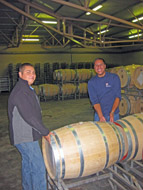The Tristan da Cunha Fishery was awarded Marine Stewardship Council accreditation in June 2011
|
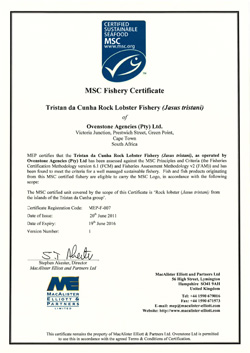
|
Event in Cape Town celebrates full MSC status for Tristan Fishery
On 19th July 2011 Cape Town’s Two Oceans Aquarium Shoreline Café hosted a special event to celebrate the success of the Tristan da Cunha rock lobster fishery whose representatives were formally awarded the Marine Stewardship Council (MSC) certificate for sustainable and well-managed fisheries.
The success of the Tristan da Cunha fishery means that they will now be able to use the blue MSC eco-label to demonstrate their commitment to sustainable seafood management practices. Congratulating the lobster fishery on their achievement, Martin Purves, MSC Southern Africa Programme Manager, (also presenting a similar award to the Shoreline Café) said: “Today shows that the MSC programme is of relevance to businesses at very different parts of the seafood supply chain, yet united in their wish to put sustainability at the heart of their operations. The Tristan lobster harvest, landed here in Cape Town, supports a tiny and remote South Atlantic community. At the MSC, we are extremely proud that our programme has been able to meet the aspirations of these very different organisations to demonstrate their commitment to sustainability, and to helping transform the seafood market.”
|
|
Photographs and reports from Tristan Director of Fisheries James Glass
Below: Scenes at the 19th July 2011 MSC Award Ceremony in Cape Town |
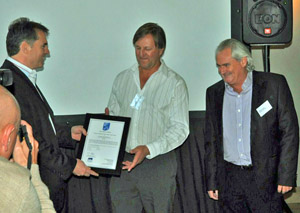
|
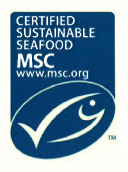
|
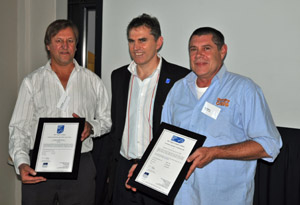
|
Martin Purves, MSC Southern Africa Programme Manager presenting Tristan Director of Fisheries James Glass with the MSC Certificate and right Managing Director of Ovenstone Dr Andrew James looks on. |
The MSC logo will now be used on Tristan fish products |
James Glass with the MSC Certificate valid until June 2016 with representatives of the Shoreline Café who received their award on the same day. |
|
World’s most remote community chooses MSC route to sustainability
The annual Tristan rock lobster (Jasus tristani) catch is around 440 tonnes and is sold mainly to markets in the United States and Japan, destined for high-end restaurants and special wedding feasts.
Cape Town fishing company, Ovenstone Agencies (PTY) Ltd, is the sole concession holder for the fishery, and certification client. Fishing at the three outer islands of Gough, Inaccessible and Nightingale, is conducted by the Ovenstone-owned freezer factory vessel, the Edinburgh, and her four dories, which fish the inshore grounds. Fishing at Tristan is conducted by Islanders employed by Ovenstone, using nine dories owned by the company. The fishery is managed by the Tristan da Cunha Fisheries Department, which sets an annual catch quota for each individual island, taking into account scientific advice from the University of Cape Town.
The fishery entered formal assessment in January 2010, assisted by funding from the SustainableFisheries Fund, and has been examined against the three principles of the MSC standard for sustainable fisheries. Passing the assessment demonstrates that the fishery is managed in a way that does not lead to over-fishing; that it maintains the health and productivity of the wider marine ecosystem; and that it has an effective management system in place.
Receiving the certificate, Dr Andrew James, Managing Director, Ovenstone Agencies, said: “We’re delighted that our careful stewardship of this natural resource has been recognised by certification to the demanding MSC standard….”
James Glass, Director of Fisheries, Tristan da Cunha, said: “The careful management of the lobster fishery is the foundation of the continued economic independence of the Tristan community. MSC certification will, we hope, help us keep and find new markets and the globally-recognised eco-label will help customers differentiate our lobsters from others…” |
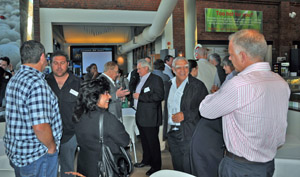
|

|
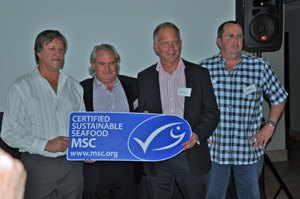
|
Scene at the Two Oceans Aquarium Shoreline Café showing in the front left to right Erik McKenzie, Leon Glass, Tristan House in Cape Town Managers Joy and Eugene Stoffberg and Dorrien Venn |
Tristan Director of Fisheries James Glass, Managing Director of Ovenstone Dr Andrew James , Dorrien Venn from Ovenstone and Tristan Factory Manager Erik McKenzie with the MSC logo. |
|
The importance of MSC Certification.
Commercial fishing of Jasus tristani yields more than 400 tonnes of lobster per year and is critical to the well being of Tristan da Cunha’s economy. Although raw tails are exported to America and raw/ whole-cooked lobster to the Japanese markets, the Fisheries Department realised the advantage of directing some exports to the European Union. In order to do this, it was necessary for the island’s fishing authorities to meet European requirements for food safety conditions.
Once the importance of developing an independent approach to the European Commission had been recognised, it was agreed that Fisheries Department staff should be trained. |
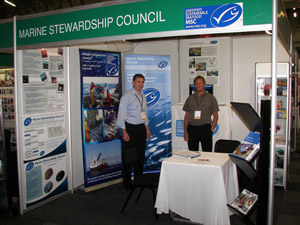
|

|
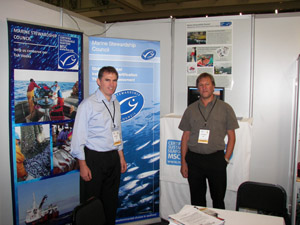
|
Martin Purves, MSC Southern Africa Programme Manager with Tristan Director of Fisheries James Glass
at a MSC Exhibition Stand in Cape Town in March 2010 |
|
2010 Training Event Five Tristan Fishery Inspectors, (Warren Glass, Tanya Green, Sarah Glass, Rodney Green and James Glass) underwent a one-month training course last year, specifically designed and delivered by Swift Micro Laboratories, a South African company that provides a comprehensive product-safety service to the food, beverage, cosmetics, hospitality and related industries throughout the SADC region. The company specialises in microbiological product testing , the design, implementation and auditing of quality-management systems, staff training (from floor-worker to management level), as well as on-site technical consultancy service. In this instance, it provided theoretical and practical training that could be applied in the lobster and related industries to equip inspectors with the knowledge and skills to competently execute their roles. The plan was to strengthen legislation and control systems as well as practices with regard to hygiene conditions of fishery products, to identify areas of weakness and to propose measures to strengthen them. |
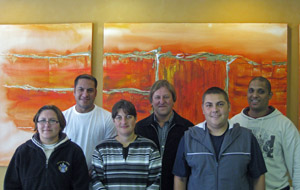
|
|
|
Left: Photo taken on 28th May 2010
of the Tristan Fisheries Department Team
at the Swift Laboratories Training Centre
in Cape Town.
Left to right: Sarah Glass, Warren Glass, Tanya Green,
James Glass, Rodney Green
and Swift trainer Thomas Smith. Right -Rodney Green and Warren Glass at a Cape Winery on 26th May 2010 |
With this in mind, course content included an overview of food safety, EC food legislation and food safety in international trade. Swift Micro Laboratories’ training modules included basic hygiene and HACCP, internal auditing, legislation and microbiology. Practical application was demonstrated at factory level and included visits to several lobster and fish-processing facilities.
Experiencing hands-on, food-safety system functioning was an essential component of the programme and included a visit to a lobster-holding facility where Good Manufacturing Practices (GMPs) were observed in a factory.
Packing preparation, lobster packing and viewing lobster-holding facilities were also the order of the day, with attendees travelling to a number of premises - these included a fish-canning facility and an evening visit to a fishery where lobster was packed for the Hong Kong market.
The benefits of these outings were great as attendees observed production, cold storage, material store, process layout, staff facilities, hygiene practices, traceability and quality-control practices. Visits to additional food-processing facilities highlighted GMPs such as cleaning and sanitation, preventative maintenance, water sanitation, staff control, traceability procedures, facility lay-out and temperature control. A wine-bottling facility, cheese producer and tea-extract manufacturer were additional excursions that reinforced the training.
Attendees then spent time at Swift Micro Laboratories’ testing laboratory, viewing lobster sample preparation, analyses, culturing and the Gram-staining procedure.
Taken as a whole, the programme created competent authorities in Tristan da Cunha and allowed staff to develop expertise in food safety hazards and their management, exposing them to systems functioning in an EU-approved processing environment.
|
|
Administrator Sean Burns sums up the significance of the award
Taken from Sean’s article in the August 2011 Newsletter
With the MSC reaching the highest benchmark for credible certification and eco labeling programs, the certificate enables Tristan lobster to bear the blue MSC eco label, officially confirming that the Tristan lobster comes from a well managed resource where standards have been developed for sustainable fishing and seafood traceability.
MSC certification label gives Tristan lobster, already recognised as a premium quality brand, added marketing benefits with ever increasing consumer environmental awareness. The MSC label carries significant weight in Europe in particular, and effort is ongoing to ensure that the Tristan factory is in a position to produce Tristan lobster for the European market in the course of the 2011/12 fishing season.
This is excellent news for the Tristan fishery and full credit goes to Andrew James and his team from Ovenstone and to Fisheries Director James Glass and the rest of the Tristan-based fishing team for all the hard work they put in to achieve this high international standard. Another tangible example of the close working relationship we have with Ovenstone. |










